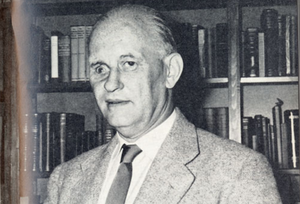Difference between revisions of "Arnold Bergstraesser"
(desc) |
m |
||
| Line 7: | Line 7: | ||
|description=German political scientist who headed some deep state groups in the 1950s and 1960s | |description=German political scientist who headed some deep state groups in the 1950s and 1960s | ||
|constitutes=academic, deep state functionary | |constitutes=academic, deep state functionary | ||
| − | |||
|employment={{job | |employment={{job | ||
|title=Atlantik-Brücke/Chairman | |title=Atlantik-Brücke/Chairman | ||
| Line 27: | Line 26: | ||
Bergstraesser was a founding member of the German Academic Exchange Service in 1925. He received his doctorate from [[Heidelberg University]]. He fled Germany in 1937, as his university service at Heidelberg was terminated due to his family's Jewish origins. | Bergstraesser was a founding member of the German Academic Exchange Service in 1925. He received his doctorate from [[Heidelberg University]]. He fled Germany in 1937, as his university service at Heidelberg was terminated due to his family's Jewish origins. | ||
| − | + | ==Career== | |
| + | Arnold Bergstraesser taught until 1954 at several American universities including the [[University of Chicago]]. He returned to Germany accepting a professorship in Political Science at the [[University of Munich]], before he changed to a professorship in Sociology and Political Science at the [[University of Freiburg]] in 1954. | ||
From 1955 to 1959 Bergstraesser was director of the research institute of the [[German Council on Foreign Relations]] (DGAP) and editor of the “Yearbook for International Politics”. In 1958 he founded the [[Ost-West-Institut,|East-West Institute]], today's Wiesneck Study House for political education.<ref>http://portal.uni-freiburg.de/politik/seminar/netzwerk/studienhaus-wiesneck</ref> From 1958 to 1960 he was a member of the board of trustees of the [[Friedrich Naumann Foundation]]. From 1959 he headed the student research group developing countries, from which the [[Arnold Bergstraesser Institute]] later emerged. | From 1955 to 1959 Bergstraesser was director of the research institute of the [[German Council on Foreign Relations]] (DGAP) and editor of the “Yearbook for International Politics”. In 1958 he founded the [[Ost-West-Institut,|East-West Institute]], today's Wiesneck Study House for political education.<ref>http://portal.uni-freiburg.de/politik/seminar/netzwerk/studienhaus-wiesneck</ref> From 1958 to 1960 he was a member of the board of trustees of the [[Friedrich Naumann Foundation]]. From 1959 he headed the student research group developing countries, from which the [[Arnold Bergstraesser Institute]] later emerged. | ||
| Line 39: | Line 39: | ||
==References== | ==References== | ||
{{reflist}} | {{reflist}} | ||
| − | |||
Latest revision as of 16:29, 16 June 2021
(academic, deep state functionary) | |||||||||||||||||||||||
|---|---|---|---|---|---|---|---|---|---|---|---|---|---|---|---|---|---|---|---|---|---|---|---|
 | |||||||||||||||||||||||
| Born | July 14 1896 | ||||||||||||||||||||||
| Died | February 24 1964 (Age 67) | ||||||||||||||||||||||
| Nationality | German | ||||||||||||||||||||||
| Member of | Atlantik-Brücke | ||||||||||||||||||||||
German political scientist who headed some deep state groups in the 1950s and 1960s
| |||||||||||||||||||||||
Arnold Bergstraesser was a German political scientist and suspected deep state functionary.
Bergstraesser was a founding member of the German Academic Exchange Service in 1925. He received his doctorate from Heidelberg University. He fled Germany in 1937, as his university service at Heidelberg was terminated due to his family's Jewish origins.
Career
Arnold Bergstraesser taught until 1954 at several American universities including the University of Chicago. He returned to Germany accepting a professorship in Political Science at the University of Munich, before he changed to a professorship in Sociology and Political Science at the University of Freiburg in 1954.
From 1955 to 1959 Bergstraesser was director of the research institute of the German Council on Foreign Relations (DGAP) and editor of the “Yearbook for International Politics”. In 1958 he founded the East-West Institute, today's Wiesneck Study House for political education.[1] From 1958 to 1960 he was a member of the board of trustees of the Friedrich Naumann Foundation. From 1959 he headed the student research group developing countries, from which the Arnold Bergstraesser Institute later emerged.
He was also President of the German Commission for UNESCO and played a key role in founding the Academy for Political Education in Bavaria, and in introducing social studies classes in secondary schools.
The think tank “Working Group on Science and Politics” formed on his initiative in 1961, which later transformed into the foreign policy think tank and policy advisor German Institute for International and Security Affairs (SWP).